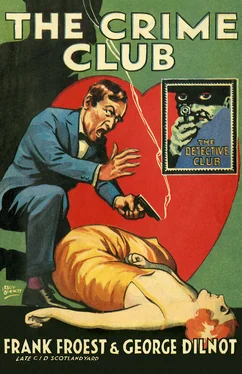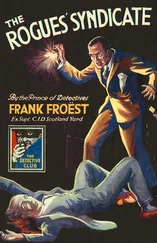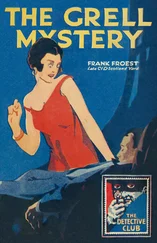Search the newspaper files of the world and you will here and there get a hint of remarkable things done by these men—of supreme feats of organisation in pursuit, of subtleties in unveiling mysteries, of bulldog courage and tenacity, of quick-witted resource in emergencies. You will not find all the truth there because there are sometimes happenings of which it is not well all the truth should be known; but you will gather much from the manner of men they are.
Sometimes, over coffee and cigars, the talk may drift to some of the affairs of the profession. Some of these find a place in the present chronicles.
II
THE RED-HAIRED PICKPOCKET
JIMMIE ILES was ‘some dip’. That was how he would have put it himself. In the archives of the New York Central Detective Bureau the description was less concise, but even more plain: ‘James (Jimmie) Iles, alias Red Jimmie, alias , etc … expert pickpocket …’
And Red Jimmie, whose hair was flame coloured and whose indomitable smile flashed from ear to ear on the slightest provocation, would have been lacking in the vanity of the underworld if he had not been proud of his reputation at Mulberry Street. Nevertheless, fame has its disadvantages, and though he was on friendly terms with the headquarters staff individually, he hated the system that had of late prevented his applying his undoubted talents to full profit.
England beckoned him—England, where he could make a fresh start with the past all put behind him. Do not make a mistake: Jimmie had no intention of reform. But in England there were no records, and consequently the police would not be allowed points in the game. It would be hard, therefore, if an energetic, painstaking man could not pick up enough to keep him in bread and butter.
Behold Jimmie, therefore, a first-class passenger on the S.S. Fortunia —‘Mr James Strickland’ on the passenger list—a suit in the Renaissance style of architecture built about him, the skirts of his coat descending well towards his knees, his peg-top trousers roomy and with a cast-iron crease. Behold him explaining for the fiftieth time to one of his sometime ‘stalls’ the reason that had driven him from God’s own country.
‘I’m too good-natured. That’s what’s the matter with me. The bulls are right on to me. If I carried a gun or hit one of ’em, like Dutch Fred, I might get away with it sometimes. But I can’t do it. They’re good boys, though they’ve got into a kind of habit of pulling me whenever they’re feeling lonely. I can’t go anywhere without a fourt’ of July procession of sleuths taggin’ after me— Holy Moses, there’s one there now. How do you do, Mr Murray? Say, shall we find if there’s a saloon?’
Detective-Sergeant Murray grinned affably. ‘Not for mine, Jimmie old lad. I’ve got that kind of lonesome feeling. Won’t you see me home?’
Jimmie thrilled with a tremor of familiar apprehension. ‘Honest to Gawd, I ain’t done a thing,’ he declared earnestly. ‘You’re only jollying, Mr Murray?’
The officer laughed and vanished. Jimmie decided to make himself inconspicuous till the vessel sailed. Luckily for his peace of mind, he did not know that the Central Office was paying him the compliment of a special cable in order that he might receive proper attention when he landed.
Jimmie was ‘good’ on board, though more than once he was tempted. It was not till he was on the boat-train from Liverpool to London that he fell. There was only one fellow-passenger in the compartment with him—a burly, prosperous man of middle age whom Jimmie knew from ship-board gossip to be one Sweeney, partner in a Detroit firm of hardware merchants. There was a comfortable bulge in his right-hand breast pocket—a bulge that made Jimmie’s mouth water. He had no fear but that he could reduce that swelling when he chose. The only trouble was ‘the getaway’. He had no ‘stalls’ to whom to pass the booty. He would have to lift the pocket-book as they got out at Euston if he did it at all. It was too risky to chance it before.
Five minutes before the train drew in at Euston, Sweeney began to collect his hand baggage. He patted his breast pocket to make sure that the pocket-book was still there. Jimmie felt pleased that he had restrained himself. He brushed by Sweeney as the train drew up, and as he passed on to the platform he knew the exultation of the artist in a finished piece of work. The pocket-book was in his possession.
Not until he had reached his hotel, and was safe in the seclusion of his own room did he examine the prize—having first ordered a fire in view of eventualities. There was a bunch of greenbacks and English notes totalling up to forty pounds—not a bad haul. Also there were a score or so of letters. Jimmie dropped the pocket-book itself on the fire, and raked the coals round it. Then he settled himself to read the correspondence before consigning it to the flames. Waste not, want not; and although Jimmie held rigidly to the line of business in which he was so adept, he was not averse to profiting from the by-products. One never knew what information might be in a letter. Jimmie had more than once gained a hint which, passed on to the right quarters, had earned him a ‘rake off’ from a robbery that was decidedly acceptable.
There seemed, however, nothing of that kind here. The letters were merely ordinary business jargon on commonplaces of commerce, and half a dozen or so introductions which a business man visiting Europe might be expected to carry. One by one the flames consumed them. Then he came to the last one and hitched his shoulders as he read. It had been printed by pencil, evidently at some trouble.
‘DEAR SWEENEY,—We are not going to be played with any longer. If you are in earnest you will come over and see us. The Fortunia sails on the seventeenth. The evening following her arrival, one of us will wait for you between ten and twelve at the Albert Suspension Bridge, Battersea. You will make up your mind to come if you are wise. We can then settle matters.—O. J.’
A man may be a pickpocket and retain a certain amount of human nature. A crook who is in business for profit rarely has opportunities to consider romance. If there is anything in the nature of a show, he usually plays the part of the foiled villain. So if he has a taste that way he indulges in fiction, the theatre, or the cinema, so that he can safely gratify his natural sympathies on the side of virtue. Jimmie was fond of the cinema. Often he had been so engrossed by the hair-raising exploits of a detective that he had totally neglected the natural facilities afforded by darkness and entertainment.
Now, however, he was suddenly plunged into an affair that promised real life melodrama. The printed characters, the mysterious appointment late at night, the ambiguous threat, were something for his imagination to gloat over. His fertile brain wove fancies of the Black Hand, the Mafia, and kindred blackmailing societies which the Sunday editions of the New York papers had painted crimson in his mind. He thrust the letter into the fire, and went out in search of one Four-fingered Foster, sometime an associate of his in New York, now established in a snug little business ‘bunco steering’ in London. Foster had been notified in advance of his coming.
He found his four-fingered friend established under the rôle of an insurance agent at a Brixton boarding-house, and Foster was willing and anxious to show the friend of his youth the town. So thoroughly indeed did they celebrate the reunion that ten o’clock had gone before Jimmie recalled the note. He swallowed the remnants of some poisonous decoction while they lounged before the tall counter of an American bar near Leicester Square.
‘Say, Ted,’ he remarked, his pronunciation extremely painstaking. ‘Where’s Albert Bridge?’
Читать дальше












